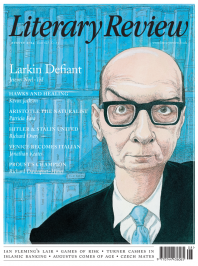Seamus Perry
Treasure Seekers
A Strange Business: Making Art and Money in Nineteenth-Century Britain
By James Hamilton
Atlantic Books 384pp £25
Most of the Victorians whom we still admire thought that 19th-century Britain had its values in a bad knot. Indeed, that ‘Victorian’ persists in modern political discourse as a term meaning something like ‘heedless and self-righteous complacency’ must be largely down to the achievement of the Victorian intelligentsia, almost all of whom thought that their age was founded on some disastrous moral incompetence, thanks to which genuine and specious senses of value were continually getting confused. The only real wealth was ‘life’, as Ruskin asserted; and though his attempt to work out some anti-Utilitarian economics in ‘Unto This Last’ was perhaps more inspiring than it was economically cogent, the point could be established more figuratively in fiction. Dickens does it with cartoonish unfairness to the Benthamites in Hard Times. More beautifully, George Eliot’s Silas Marner arrives at its turning point when the bleak old miser finds that his piles of gold have been replaced by the living golden curls of the little girl who will become his adopted daughter and salvation. Silas had been working with the wrong theory of what constituted treasure: Wilde’s joke about knowing the price of everything and the value of nothing drew on a long tradition of high-minded discontent.
It has been widely noticed among commentators, of course, that Ruskin was a rich man, and that Dickens and George Eliot were novelists who enjoyed startling commercial success. It would be obtuse to think their worldly success somehow rendered their ethics bogus but, equally, a full account would need to

Sign Up to our newsletter
Receive free articles, highlights from the archive, news, details of prizes, and much more.@Lit_Review
Follow Literary Review on Twitter
Twitter Feed
It wasn’t until 1825 that Pepys’s diary became available for the first time. How it was eventually decrypted and published is a story of subterfuge and duplicity.
Kate Loveman tells the tale.
Kate Loveman - Publishing Pepys
Kate Loveman: Publishing Pepys
literaryreview.co.uk
Arthur Christopher Benson was a pillar of the Edwardian establishment. He was supremely well connected. As his newly published diaries reveal, he was also riotously indiscreet.
Piers Brendon compares Benson’s journals to others from the 20th century.
Piers Brendon - Land of Dopes & Tories
Piers Brendon: Land of Dopes & Tories - The Benson Diaries: Selections from the Diary of Arthur Christopher Benson by Eamon Duffy & Ronald Hyam (edd)
literaryreview.co.uk
Of the siblings Gwen and Augustus John, it is Augustus who has commanded most attention from collectors and connoisseurs.
Was he really the finer artist, asks Tanya Harrod, or is it time Gwen emerged from her brother’s shadow?
Tanya Harrod - Cut from the Same Canvas
Tanya Harrod: Cut from the Same Canvas - Artists, Siblings, Visionaries: The Lives and Loves of Gwen and Augustus John by Judith Mackrell
literaryreview.co.uk